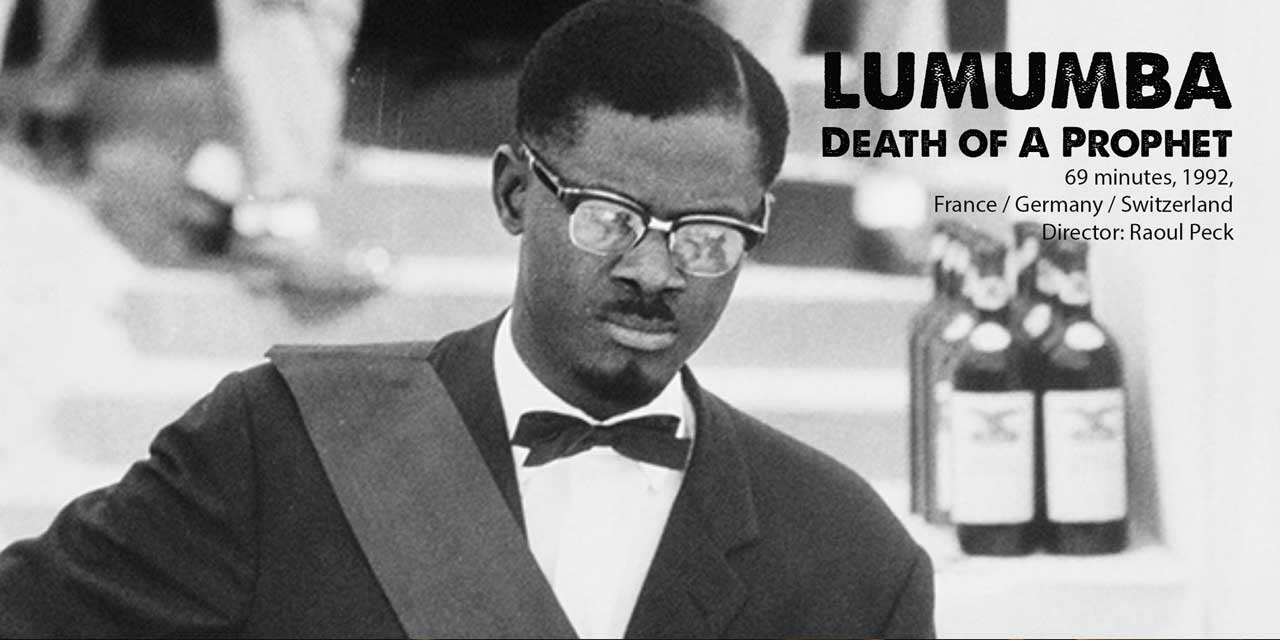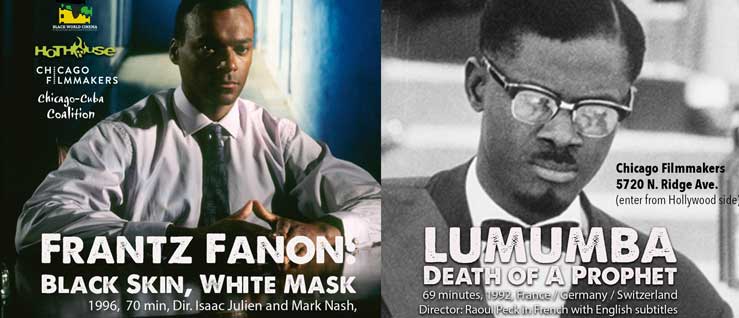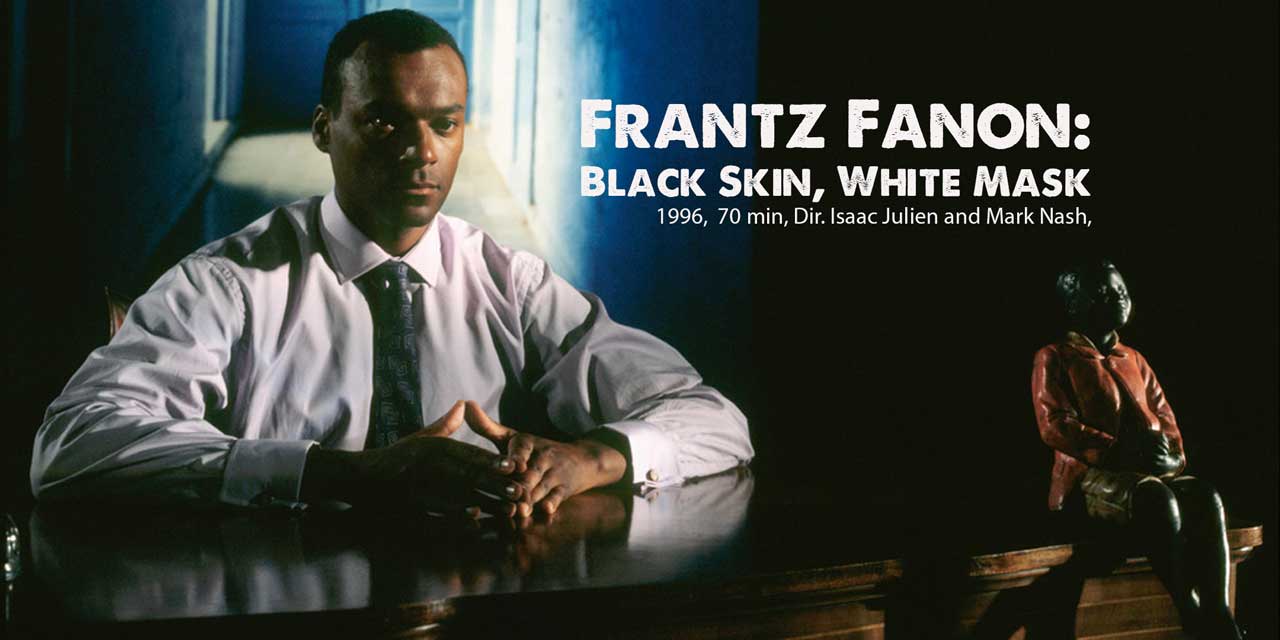Sat, Dec 1, 7pm | Fanon: Black Skin/White Mask w/Lumumba: Death of A Prophet
by
Sat, Dec 1, 7pm | Fanon: Black Skin/White Mask
w/Lumumba: Death of A Prophet
Chicago Filmmakers
5720 North Ridge Avenue
7:00pm -10:00pm
Buy Tickets NOW!
Frantz Fanon: ‘Black Skin, White Masks’, 1996, UK, 70 minutes”
Director: Isaac Julien
Interviews, reconstructions and archive footage tell the story of the life and work of the highly influential anti-colonialist writer Frantz Fanon, author of ‘Black Skin, White Masks’
Fanon, has also been acclaimed for writing ‘The Wretched of the Earth’ and for his professional life as a psychiatric doctor in Algeria during its war of independence with France.
‘Frantz Fanon: Black Skin, White Mask is a seventy-minute drama-documentary film Isaac Julian and Mark Nash produced in 1996. The impetus for the film project was to restore to academic and artistic discourses a recognition of both the originality and contradictory nature of this major thinker. It was initially conceived as a reflection on the revival of interest in Fanon’s ideas in black visual and performance arts. The black arts movement in Britain and North America had sought a more substantial basis for reflection on the black body and its representations. In development, the film’s mandate became broader to include other aspects of Fanon’s influence and legacy.’
Filmmaker and installation artist, Isaac Julien CBE RA, was born in 1960 in London, where he currently lives and works. His multi-screen film installations and photographs incorporate different artistic disciplines to create a poetic and unique visual language. His 1989 documentary-drama exploring author Langston Hughes and the Harlem Renaissance titled Looking for Langston garnered Julien a cult following while his 1991 debut feature Young Soul Rebels won the Semaine de la Critique prize at the Cannes Film Festival.
Having recently worked on conserving and restoring Looking for Langstonimages from his extensive archive, he exhibited of photographic works at Victoria Miro Gallery, London (2017), Jessica Silverman Gallery, San Francisco (2016) and Ron Mandos Gallery, Amsterdam (2016) with a screening of the film in its original 16mm print at Tate Britain.
Lumumba: La Mort du Prophète
 (Death of A Prophet), France, 1990, 69 min
(Death of A Prophet), France, 1990, 69 min
Director:Raoul Peck
Lumumba: La Mort du Prophète offers a unique opportunity to reconsider the life and legacy of one of the legendary figures of modern African history. Like Malcolm X, Patrice Lumumba is remembered less for his lasting achievements than as an enduring symbol of the struggle for self-determination. This deeply personal reflection by acclaimed filmmaker Raoul Peck on the events of Lumumba’s brief twelve month rise and fall is a moving memorial to a man described as a giant, a prophet, a devil, “a mystic of freedom,” and “the Elvis Presley of African politics.”
A film essay in the tradition of Night and Fog or The Sorrow and the Pity, Lumumba: La Mort du Prophète explores how any image inevitably represses the multiple stories surrounding it, how the past as preserved by the media is always in a sense the hostage of history’s winners. Therefore present-day Europe figures as prominently in Lumumba as the Congo in 1960, because Europe was the unseen hand behind the camera and the events leading to Lumumba’s assassination. Peck presents an unfamiliar Europe seen through the eyes of a visitor from the Third World – cold, affluent, a guilty present trying to forget its past. Yet, as this film testifies, Lumumba’s prophecy will not be silenced until Africa achieves its second independence where the promises of the first can be fulfilled.
RAOUL PECK was born in Port-au-Prince, Haiti. In 1961 his parents fled the Duvalier dictatorship, finding asylum and a new life in the recently independent Republic of Congo, which became their second home for nearly 25 years. Raoul Peck attended school in Leopoldville, later public school in Brooklyn, NY and finally Orleans, France. Upon completing his Baccalaureat, he left for Germany where he studied economics and industrial engineering. After completing his diploma, Raoul Peck worked for one year as a taxi driver in New York City while awaiting his acceptance at the German Film and Television Academy (DFFB) in Berlin. He was accepted along with 17 other colleagues into the class of 1984. While a student at the DFFB, Peck completed his first award-winning full-length feature–a film made for $150,000–HAITIAN CORNER, shot in Brooklyn and in Haiti. Other projects soon followed, establishing him as one of the most prominent and prolific black filmmakers.

